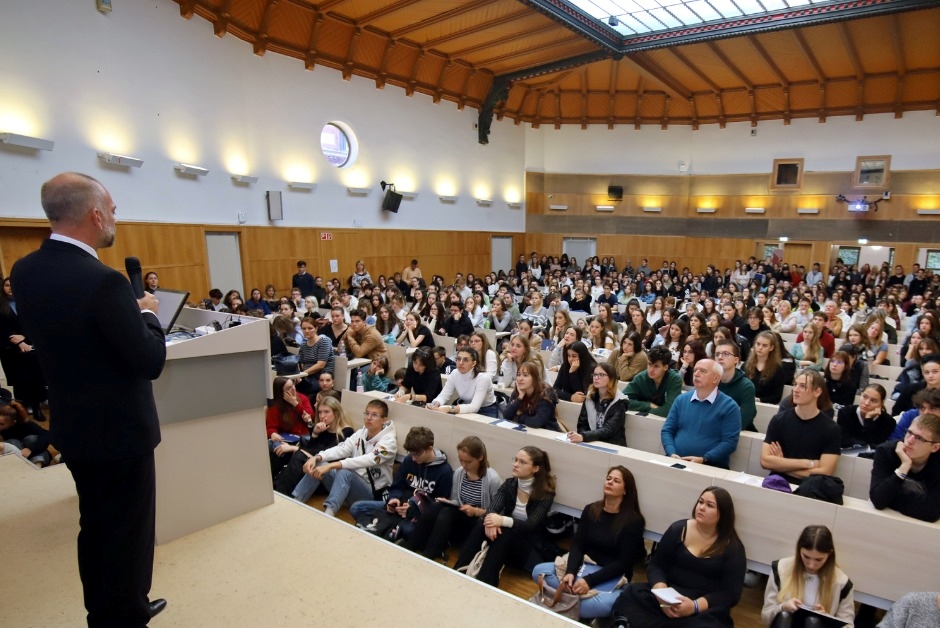
If the European programs were to be relaunched, the Hungarian alternative scholarship program would remain, he stressed.Continue reading

Not only are Hungarian universities now excluded from the EU’s Erasmus program, but an institution in Vienna has also been added to the list, reports Mandiner. Modul University’s seemingly main offense is that it is owned by a Hungarian talent institution.
The European Commission has excluded Vienna’s Modul University from the Erasmus program, citing the fact that the university, specializing in tourism studies, is 90 percent owned by Mathias Corvinus Collegium (MCC) from 2023, according to the print edition of Der Standard.
The article says that the institution is “a training ground for the Orbán regime” and is heavily subsidized by the Hungarian government.
Modul University reacted by stating that it does not consider the Commission’s decision to be justified and will take all necessary steps to reverse it. The institution stressed that students will not suffer any disadvantage as a result, as they will receive the same support in the future as if it had been provided by the European Union.
It is important to note the double standards that arise in the Erasmus debate. Radical Muslims and even Russians, who are sanctioned at all costs, can participate in Erasmus and Horizon programs, but Hungarians cannot.
French MEP outraged at @EU_Commission ‘s 250 000 € @Erasmus grant to openly pro-Hamas Turkish university.
Russians students still eligible under #Erasmus and #HorizonEU .
➡️ EU education only weaponised against 21 universities… in the whole world.
Fair? https://t.co/S1tjHpAGik
— Rodrigo Ballester (@rodballester) October 10, 2024
MCC has reacted to the situation on X, writing in a post that the “European Commission’s decision to target students as collateral damage in political disputes is as baseless as it is petty.” The institution shared Balázs Orbán’s post, in which the chairman of MCC’s board stated that “This outrageous decision punishes EU students and exposes the Commission’s political bias and double standards.” He added that they are counting on Austria’s new government to step up in the matter. “Unlike its predecessor, we hope it won’t quietly support or condone Brussels’ discrimination but will stand up for Austrian students’ rights and the freedom of education and research demanded by Austrian law!”
The European Commission’s decision to target students as collateral damage in political disputes is as baseless as it is petty.
Despite this misguided action, Modul University will continue to deliver exceptional education to its students without any major disruption. https://t.co/YUR4dww5lI
— Mathias Corvinus Collegium (@MCC_Budapest) January 22, 2025
Being excluded from the Erasmus program is not new for Hungarian universities. In 2023, the European Commission suspended grants from the Erasmus+ and Horizon Europe programs for 21 Hungarian universities operating as public trust foundations. The decision was driven by concerns over governance transparency, academic independence, and conflicts of interest, as many university boards included government-aligned trustees. While the Hungarian government called for the resignation of these officials in February, legislative changes to address the conflict of interest were not implemented, leaving the issue unresolved and funding restricted.
Last autumn, Hungary adopted an amendment with the aim of enhancing university governance transparency and independence by introducing key changes.
Trusteeships are capped at six years, high-ranking government officials are barred from serving on boards during their term, a one-year cooling-off period applies for former officials, and the State Audit Office will oversee conflict-of-interest compliance.
However, the European Commission decided last December that the Hungarian model-changing universities will still not be able to participate in the Erasmus+ and Horizon programs despite the reform package presented by the government at the beginning of December.
In a statement, the Commission chaired by Ursula von der Leyen announced that the reform presented “is not sufficient to address risks of conflicts of interests” in the boards of the university foundations’ public interest trusts.
Via Mandiner, Der Standard; Featured photo via Facebook/MCC